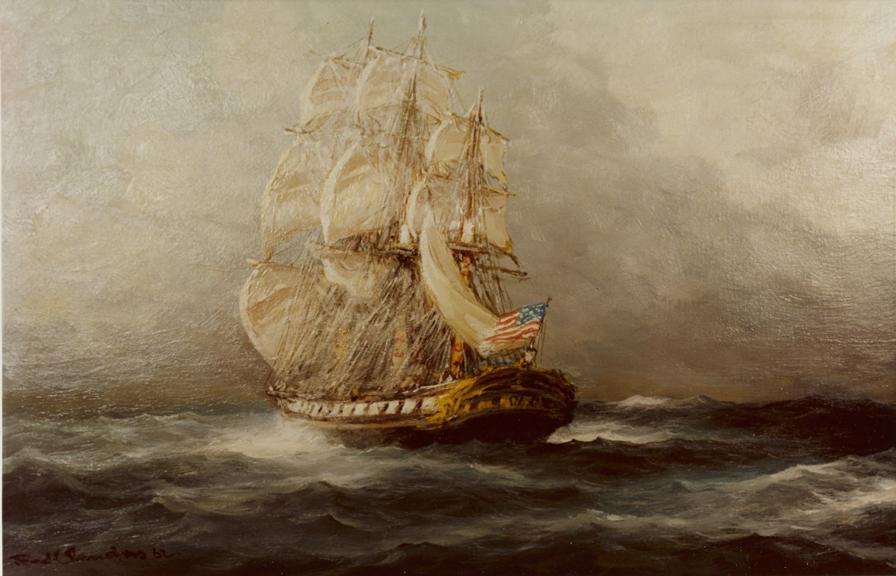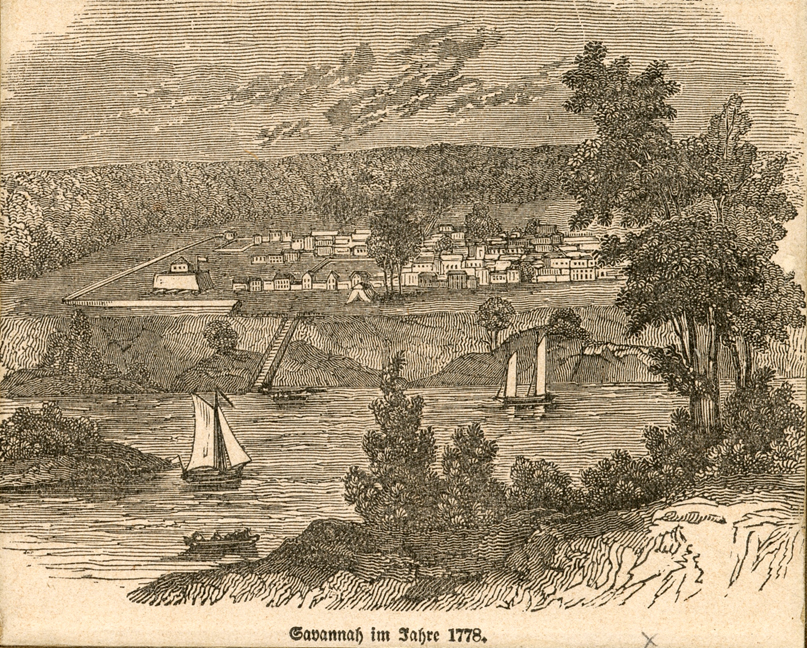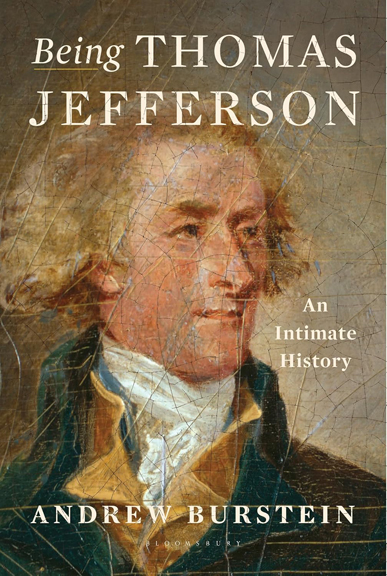We sometimes use the phrase “at the right place at the right time” when describing the circumstances of someone’s good fortune. In war, the “right place” is often the place where the most important events were not happening. That sounds convoluted, but the case of George Shall will clarify the point.
Shall, a native of York, Pennsylvania, was a soldier in Colonel George Michael Swope’s Regiment of the Pennsylvania Flying Camp. The Flying Camp was a force formed in June 1776, so called because it was expected to be highly mobile in response to the British army’s ability to strike anywhere along the Atlantic coast. It was recruited from Pennsylvania, Maryland and Delaware, often from the ranks of militia units. Regiments of the Flying Camp participated in many of the actions around New York in August, September and October.
A critical part of the American defensive strategy was two fortifications, Fort Washington and Fort Lee, named after the two senior generals of their army. Fort Washington stood on the highest point in Manhattan, near the northern end of the island. Fort Lee was on the New Jersey side of the Hudson River, diagonally just south of Fort Washington; together, it was hoped that the two would prevent British ships from passing up the river (Fort Washington and Fort Lee were located roughly where the George Washington Bridge stands today; although nothing remains of Fort Washington, Fort Lee is a historical park well worth visiting).
In November, Swope’s regiment was in New Jersey contributing to the construction of Fort Lee. When it looked like Fort Washington, formidable but now isolated, would soon be attacked, they were sent across the river to reinforce the Fort Washington garrison. Two days later, 16 November 1776, the fort was stormed by British and German troops. The garrison of nearly 3000 men were taken prisoner and suffered terribly in captivity for the next few months. George Shall, however, was not among them. His story is best told in his own words:[i]
“This deponent was bound apprentice to the trade of shoemaker in 1769 in the town of York in Pennsylvania, and lived there until the year 1776 when in the beginning of the month of June he left York as a private in a Militia Company commanded by Capt. William Bayly and marched under his command to Lancaster, Philadelphia, Trenton, Brunswick, Elizabethtown, Newark and thence to Parkin Point where he enlisted for six months in the service of the United States receiving eight dollars bounty. He was still under the command of Capt. Bayly, but he, Capt. Bayly was very shortly promoted to command the battalion which was part of the flying camp and was composed of five Companies. Smiers, Ewing, Doitt, Williams and ours, in the command of which Major Bayly was succeeded by Christian Stake who had been his Lieutenant. Col. Swope commanded the Regiment, I was not draughted, nor did I volunteer nor was I a substitute when I marched from York with Capt. Bayly. The whole body of enrolled Militia was called out & when we marched few were left behind but the old, the very young and the feeble.
“From Parkin Point we went up the North River to a place opposite Fort Washington, where we were forthwith set to work to build Fort Lee. When Fort Washington was taken our Colonel, Swope and Major Bayly & nearly the whole of our battalion were made prisoners of war. My own Captain Christian Stake, Lieut. Holtzinger & ensign Barnet & all the rank and file, except about fourteen, of whom I was one, were taken prisoners. I escaped capture in the following manner, two days before the capture of Fort Washington I was sent as part of a guard with two wagons, loaded I believe with ammunition from Fort Lee to Fort Washington & at the latter place, received a pass with orders to return to Fort Lee with letters of which fourteen or fifteen men were put into my hands.
“I recrossed the river with two soldiers sent with me, immediately on stepping out of the ferry boat I met my Colonel Swope who was there with the troops just about to cross over. I told him I had letters for him and it being night we went into the guard house to the light when I handed him the letters, he took all the letters except two, one directed to Gen. Ewing and one to Gen. Greene & ordered me to deliver these letters as soon as possible. I went directly to Gen. Ewing & gave him the letters; he directed me to proceed with the letter to Gen. Greene, who lived about two miles off from Fort Lee. Afterwards he changed his mind & because of the lateness of the hour, sent it by his own Servant on horseback.
“The next day we were ordered to parade to cross the river, when Gen. Washington rode up & asked what we were paraded for, & being told it was for the purpose of crossing to the island, forbade it, & said he was sorry so many had already gone over for they would probably be lost. The next day was the battle & Capture of Fort Washington. After that event we retreated to Trenton & thence across the Delaware where we encamped in the woods (without tents) for about three weeks until the day after Christmas 1776 when we pushed over again to Trenton and captured the Garrison, the hessian Troops.”
So it was that this Pennsylvanian, by diligently doing his duty, missed the battle that saw most of his comrades imprisoned, many never to return. He had escorted supplies from Fort Lee to Fort Washington, and returned carrying letters just in time to meet his regiment preparing to cross the Hudson River. But instead of joining them, he was sent to deliver some of the letters to other officers. By the time he finished with this minor but important task, General Washington had decided that Fort Washington was untenable and refused to allow any more troops to cross over to it, not even private Shall and the handful of others left behind by their regiments. This left him free to fight another day, that day being the famous surprise attack on Trenton that rallied the flagging American cause – even though the German garrison captured there was only about a third the size of the one lost at Fort Washington.
[i] Pension Application of George Shall. M-804, Pension and Bounty Land Application Files, No. S7493, National Archives and Records Administration, Washington, DC. Paragraph breaks have been added for readability.









6 Comments
Any war is about guns and strategies. During the Revolution, for instance, they had to take into account one crucial factor that has disappeared with the introduction of our modern communications: time for communicating strategies to the other units, time to inform everybody of a plan to move from their position to another meeting position. A miscalculation and a troop could arrive a few days late, only to realize that it was all over. So, the couriers were of utmost importance. Were these couriers what we call today « fax machines »?
No – they’re what we *used* to call <> back in the 1980s! 😀
Couriers, dispatch riders, runners, etc. (by any name) were critical beyond the paper they carried. Messengers bore not only a specific missive but possessed greater general knowledge about the situation: messengers had just left the scene of the action and their knowledge greatly enhanced context of the message they carried. Some examples: In a time when the few maps available were either wrong or too general to be of use, messengers could describe the ground in greater detail. Other information that could benefit the responding commander might concern his route of march (how the opposing forces were arrayed, where suitable roads, fords, and topography could affect or benefit the march); or might enhance situational awareness or sense of urgency (status of the opposing or embattled forces, summary of the engagement thus far, casualty estimates, state of mind of the sender). For this reason messengers were selected for their reliability and sagacity; and, generally speaking, urgent messages were not transferred from the original bearer to another for final delivery — because that “third party” messenger could not add value beyond the piece of paper he carried.
Today we view the adage “don’t shoot the messenger” as an admonishment not to blame the bearer for bad news; but in those days shooting the messenger would have been perceived as an act of folly that destroyed the best on-scene reporting available, “making a bad situation worse”.
I love the depositions that Todd unearths–they put a human face on large and complex events. I’ll second the recommendation to visit Fort Lee. The views are spectacular and you can get a real sense there of just how difficult operations on the Hudson would have been.
I will second what Donna said about Fort Lee Historic Park. Also take a drive into the town itself and visit Monument Park, site of the actual fort built to defend the landward side against attack.
I have traced an ancestor of mine to the Penn Flying Camp, who should have been a Captain with Col. Hart/Col. Baxter. However he was not captured at Fort Washington as so many others were and in fact shows up in a muster of Penn militia in bucks county in early December 1776. I assumed that somehow he was not sent to Fort Washington, or else he would have been killed or captured. I wonder if he was one of the few Washington ordered to not cross that day. Amazing.